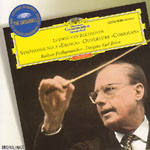This Eroica is contemporaneous with Karajan’s celebrated 1962 complete Beethoven cycle, also with the Berlin Philharmonic, and it points up some striking differences in approach. Karajan aimed for a streamlined sound with blended textures, something he would achieve to an increasing degree with each successive Beethoven cycle. Böhm cultivated a more rugged sonority, emphasizing the grit in Beethoven’s orchestration (especially those wonderfully gruff double basses in the first movement). Interpretively, Böhm’s slower tempos and straightforward phrasing may seem a bit stiff at times, but he creates a sense of enormity and greatness in the music that communicates old-world conceptions of Beethoven. Thus, the scherzo’s trio is stunningly deliberate, with pleasingly full tone from the Berlin horns. There’s nothing deliberate about the finale’s presto coda, however. While not as frenzied as Szell’s with Cleveland, it nonetheless generates substantial energy. Böhm’s emphatic approach makes for an impressive opening to the Coriolan overture, but it pays less dividends afterwards. Szell, Munch, and more recently Thomas Dausgaard and the Swedish Chamber Orchestra on Simax demonstrate how powerful an impact this piece makes at more urgent tempos. The 1961 recording is spacious, but lacks the dynamic range of Böhm’s later DG effort with the Vienna Philharmonic–an even finer performance.
































